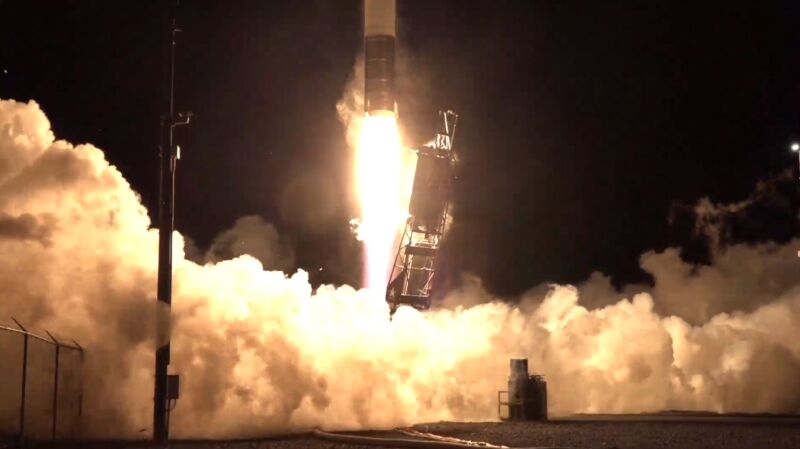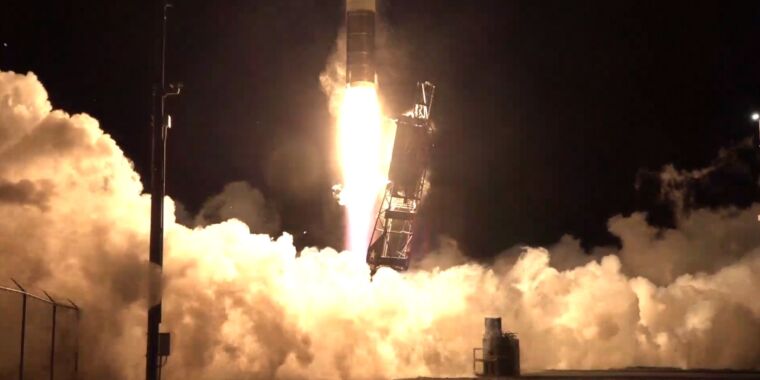
Astra
Astra never sought to build the best rocket, the biggest rocket, or the safest rocket. The California-based space company simply wanted to build a rocket that was just good enough, and to do it fast.
Early on Saturday morning, Astra proved the value of this philosophy by successfully launching a stripped-down rocket for the first time. The mission hefted a small test payload for the US Space Force into an orbit 500 km above the planet.
The launch came five years and one month after Astra was founded by Chris Kemp and Adam London in October 2016. With this weekend’s success, Astra became the fastest company to reach orbit with a privately developed liquid-fueled rocket. With its Falcon 1 rocket, SpaceX required six years and four months. Firefly, Virgin Orbit, and Rocket Lab all needed seven or more years to successfully reach orbit.
To go fast, Astra decided to spend less time designing its rocket and more time testing it in real-world conditions. A first suborbital launch attempt was completed within two years of the company’s founding, and Astra has been iterating on the vehicle’s design since then. By using iterative design, Astra has had to stomach several failures along the way.
Astra LV0007 launch attempt.
“I think that this flight really does prove out the approach we’ve taken,” Kemp said during a call with reporters on Monday morning. “We did this at a record pace because of this iterative approach.”
Astra has big plans, with aspirations to become more than a launch company. It wants to build a larger rocket, its own spacecraft, and even has applied to the Federal Communications Commission to develop a mega-constellation in low Earth orbit. But the essential first step before embarking upon these plans was to successfully reach orbit. And as a publicly traded company, iterative design or not, Astra probably could not have survived too many more failures before investors began to doubt its technical chops.
Named LV0007, this was the seventh rocket Astra has built. The first two models were strictly for suborbital tests. The third rocket was lost during a launch pad fire. In September 2020 the fourth rocket—the company’s first actual attempt at an orbital launch—failed after about 30 seconds due to a guidance error. During a subsequent attempt in December 2020, LV0005 reached space but did not have enough propellant to reach orbit.
This second flight demonstrated perfect first-stage performance, stage separation, and a second engine burn. So the company’s expectations were high on August 28, 2021, when LV0006 lifted off. But shortly after engine ignition, the rocket moved more horizontal than vertical before correcting itself and following an upward trajectory. After 148 seconds, a range safety officer terminated the flight after it moved out of its launch corridor. One of the five engines had shut down prematurely.
During the three-month-long LV0007 campaign, Astra had to contend with multiple days of sub-freezing temperatures at its launch site on Kodiak Island, in Alaska. An 8-inch water line froze solid, Kemp said. The launch team had to re-work some of their procedures. But this experience in freezing weather bodes well for launching from a diversity of environments in the future, Kemp said. The company will likely begin launching from Cape Canaveral Space Force Station in 2022.
Now that Astra has successfully reached orbit, the company can shift from “test mode” into production of its “Rocket 3” series, Kemp said. This small booster is capable of sending 50 kg to a 500-km mid-inclination orbit. Astra plans several more flights of Rocket 3, which has a price point of about $3.5 million per launch. Then it plans to transition to “Rocket 4,” which will have the capacity to lift about 200 kg to low-Earth orbit. Astra hopes to keep a similar price per launch, despite the increase in performance.
Although there are more and more small launch vehicles coming online, the demand seems to be there for Astra’s services, which cost the least per launch in the industry. Kemp said Astra has “more than 50” launches on contract. Now, with orbit attained, the company can actually focus on meeting that demand.
